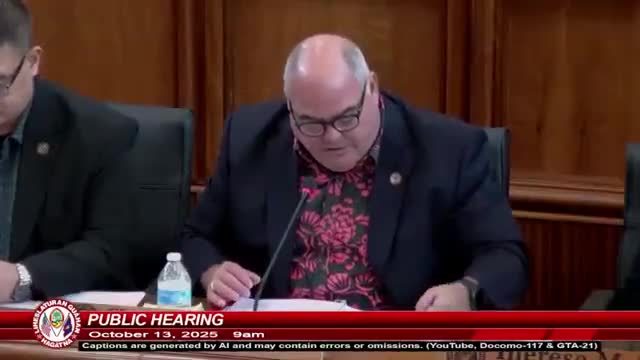Public school principals press senators for stronger maintenance and oversight as bill to extend GEF lease and raise $59 million is debated
Get AI-powered insights, summaries, and transcripts
Subscribe
Summary
Committee heard Bill 156-38, seeking to extend GEF lease arrangements to monetize future lease payments for roughly $59.37 million to fund GDOE capital needs. Principals and the superintendent said the four leaseback schools have persistent maintenance shortfalls and urged strict accountability, clearer contracts and transparency before any lease
The Guam Legislature’s Committee on Finance and Government Operations on Monday took testimony on Bill 156-38, which would authorize an extension of certain Guam Education Financing Foundation (GEF) lease agreements to generate financing for Guam Department of Education capital needs.
Senator Joe S. San Agustin introduced the bill, which as filed would extend lease terms and allow GEF to monetize future lease payments to produce roughly $59,370,000 to fund modernization, HVAC work, structural repairs and other capital priorities for Department of Education campuses, plus set-asides for equipment and debt‑service costs.
Treasurer James “Jamie” Wilson of the Guam Education Financing Foundation told the committee the leaseback model has previously been used to finance school infrastructure under Public Law 28‑47, Public Law 30‑182 and Public Law 33‑94, and that the measure was originally drafted in response to an abrupt federal deadline affecting American Rescue Plan (ARP) funds. Wilson said ARP access was later restored but administered on a reimbursement basis and recommended a markup version of the bill that would refine financing terms to accommodate reimbursement rules and prepayment options.
But principals of the four GEF‑leased campuses and Guam Department of Education officials said they support the goal of funding repairs yet opposed extending the lease without stronger maintenance standards, clearer accountability and proof the existing contractor is meeting obligations. “The 7,000,000 annual budget is not sufficient,” Assimibo Middle School Principal Hannah Gutierrez told the committee, describing repeated deferred maintenance, slow contractor response and instances where school staff or parents supplied labor and materials to pass health inspections.
Superintendent Swanson said he supports the bill’s objective but with reservations and told senators that core‑engineer estimates for districtwide needs now exceed $500 million after inflation adjustments. “Our most recent core of engineer studies put the price tag at well over $500,000,000 adjusting for inflation,” Swanson said, arguing the GEF revenue would cover only a portion of required upgrades and that changes to contract terms would be necessary if the lease were extended.
Principals described recurring problems at the four leased campuses: delayed repair of roof leaks, missing typhoon insurance, slow replacement of HVAC and gym flooring, and custodial contracts that do not provide daily classroom cleaning. Adacao Elementary principal Mevon Kengo said the custodial contract’s current scope — with some classroom cleaning described as “once a week” or “as needed” — is not adequate for elementary schools and shifts cleaning duties onto teachers.
Several senators pressed for documentation. They asked whether the maintenance shortfalls were recorded and whether repair requests and contractor performance had been tracked; principals said they maintain records, work‑order histories and communication logs and asked to be included in future contractual oversight.
The bill’s fiscal mechanics prompted questions from senators and GDOE staff: the bill text as introduced listed an annual base lease payment that various witnesses referenced differently during the hearing (the introduced bill text cited a fixed annual payment of $7,005,000; witnesses during the hearing referenced $7,500,000 and other figures in proposed markups). Treasurer Wilson said the markup version would preserve the historical debt ceiling while enabling a financing structure compatible with ARP’s reimbursement rules, including prepayment options that would reduce the annual payment if federal funds were used to retire principal early.
Multiple senators urged caution. Some argued the existing leaseback arrangement had not ensured reliable maintenance at the four campuses and said the Legislature should either (a) require stronger contractual performance, oversight and remedies before any extension, (b) put the work out to competitive bid, or (c) allow the leases to expire and transfer school ownership to GDOE while increasing internal maintenance capacity.
Senator Joe San Agustin, the bill’s author, said he introduced the measure to create a funding source at a time when federal timing and pandemic-era changes threatened to leave school repairs unfunded. He told the committee he is open to amendments and said the committee would do further markup work with stakeholders to produce a workable, accountable financing package.
What’s next: The committee closed the public hearing and said staff will circulate the bill’s mark‑up language and bring GEF, GDOE and principals back for follow-up. Senators asked for documentation on contract performance, the GEF maintenance budget and a refined financing plan before any final vote.
